BSc Business Law (BMP4002): Legal System & Employment Law
VerifiedAdded on 2023/06/14
|10
|2722
|425
Report
AI Summary
This report provides a comprehensive overview of the UK legal system, focusing on its classifications, sources, and application to employment law. It begins by defining laws and identifying the UK's legal systems, distinguishing between common and statutory law. The report then classifies laws into civil and criminal categories, explaining the roles of the High Court and Supreme Court. It explores case law and legislation as sources of law, including delegated legislation. Finally, the report examines UK employment law, outlining employers' statutory duties and addressing wrongful and unfair dismissal actions. This document is available on Desklib, a platform offering a wide range of study tools and resources for students.
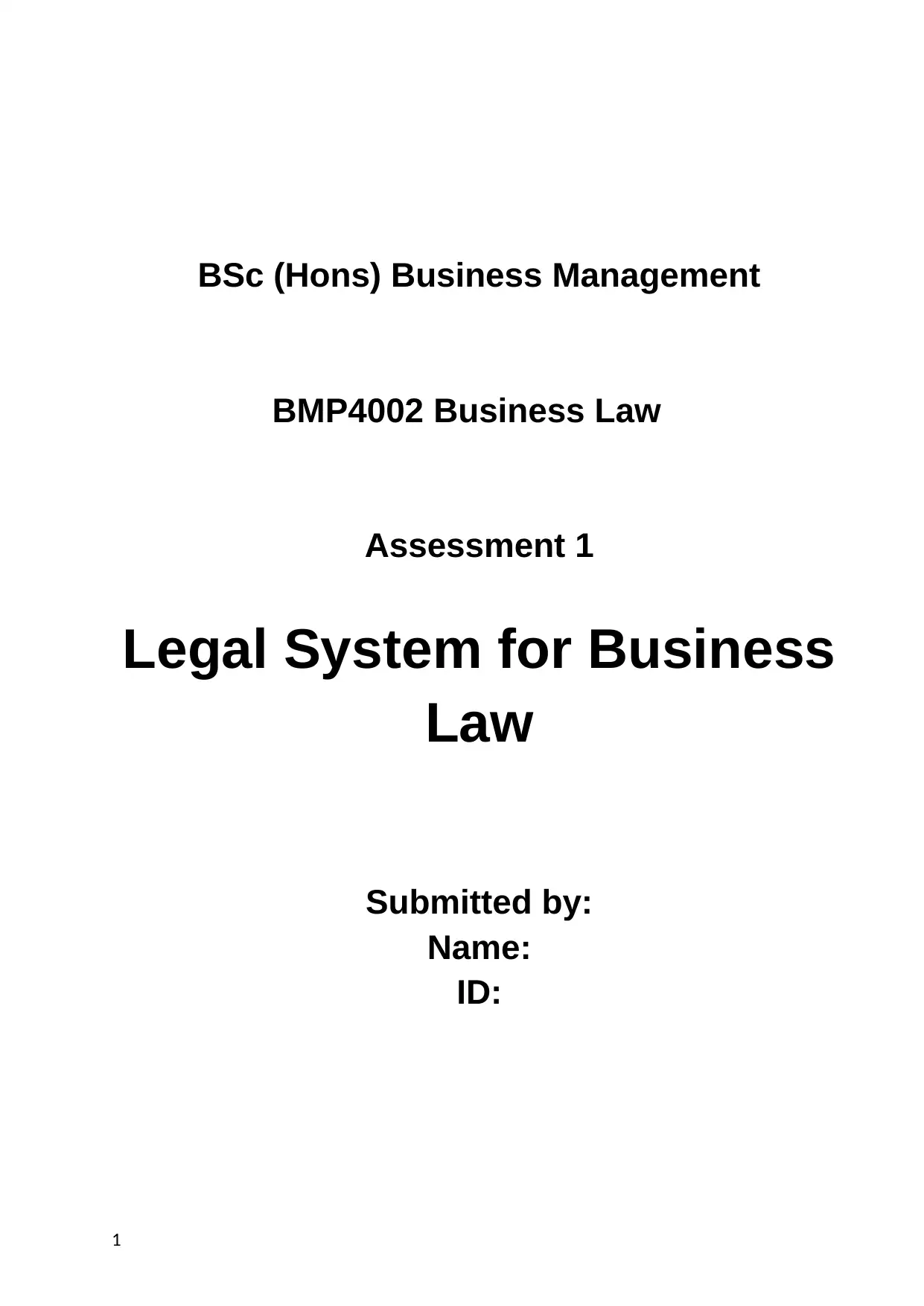
BSc (Hons) Business Management
BMP4002 Business Law
Assessment 1
Legal System for Business
Law
Submitted by:
Name:
ID:
1
BMP4002 Business Law
Assessment 1
Legal System for Business
Law
Submitted by:
Name:
ID:
1
Paraphrase This Document
Need a fresh take? Get an instant paraphrase of this document with our AI Paraphraser
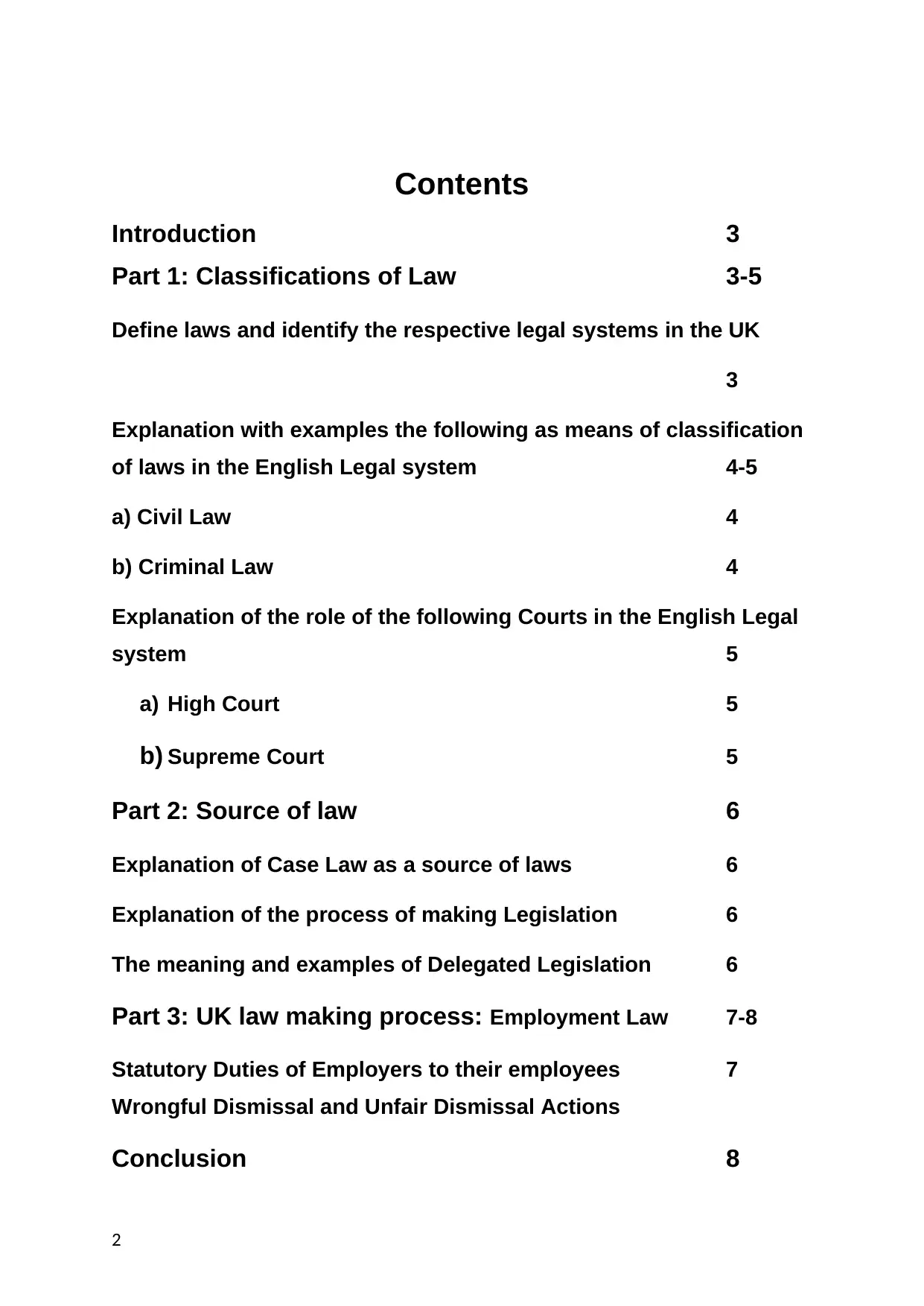
Contents
Introduction 3
Part 1: Classifications of Law 3-5
Define laws and identify the respective legal systems in the UK
3
Explanation with examples the following as means of classification
of laws in the English Legal system 4-5
a) Civil Law 4
b) Criminal Law 4
Explanation of the role of the following Courts in the English Legal
system 5
a) High Court 5
b) Supreme Court 5
Part 2: Source of law 6
Explanation of Case Law as a source of laws 6
Explanation of the process of making Legislation 6
The meaning and examples of Delegated Legislation 6
Part 3: UK law making process: Employment Law 7-8
Statutory Duties of Employers to their employees 7
Wrongful Dismissal and Unfair Dismissal Actions
Conclusion 8
2
Introduction 3
Part 1: Classifications of Law 3-5
Define laws and identify the respective legal systems in the UK
3
Explanation with examples the following as means of classification
of laws in the English Legal system 4-5
a) Civil Law 4
b) Criminal Law 4
Explanation of the role of the following Courts in the English Legal
system 5
a) High Court 5
b) Supreme Court 5
Part 2: Source of law 6
Explanation of Case Law as a source of laws 6
Explanation of the process of making Legislation 6
The meaning and examples of Delegated Legislation 6
Part 3: UK law making process: Employment Law 7-8
Statutory Duties of Employers to their employees 7
Wrongful Dismissal and Unfair Dismissal Actions
Conclusion 8
2

3
⊘ This is a preview!⊘
Do you want full access?
Subscribe today to unlock all pages.

Trusted by 1+ million students worldwide
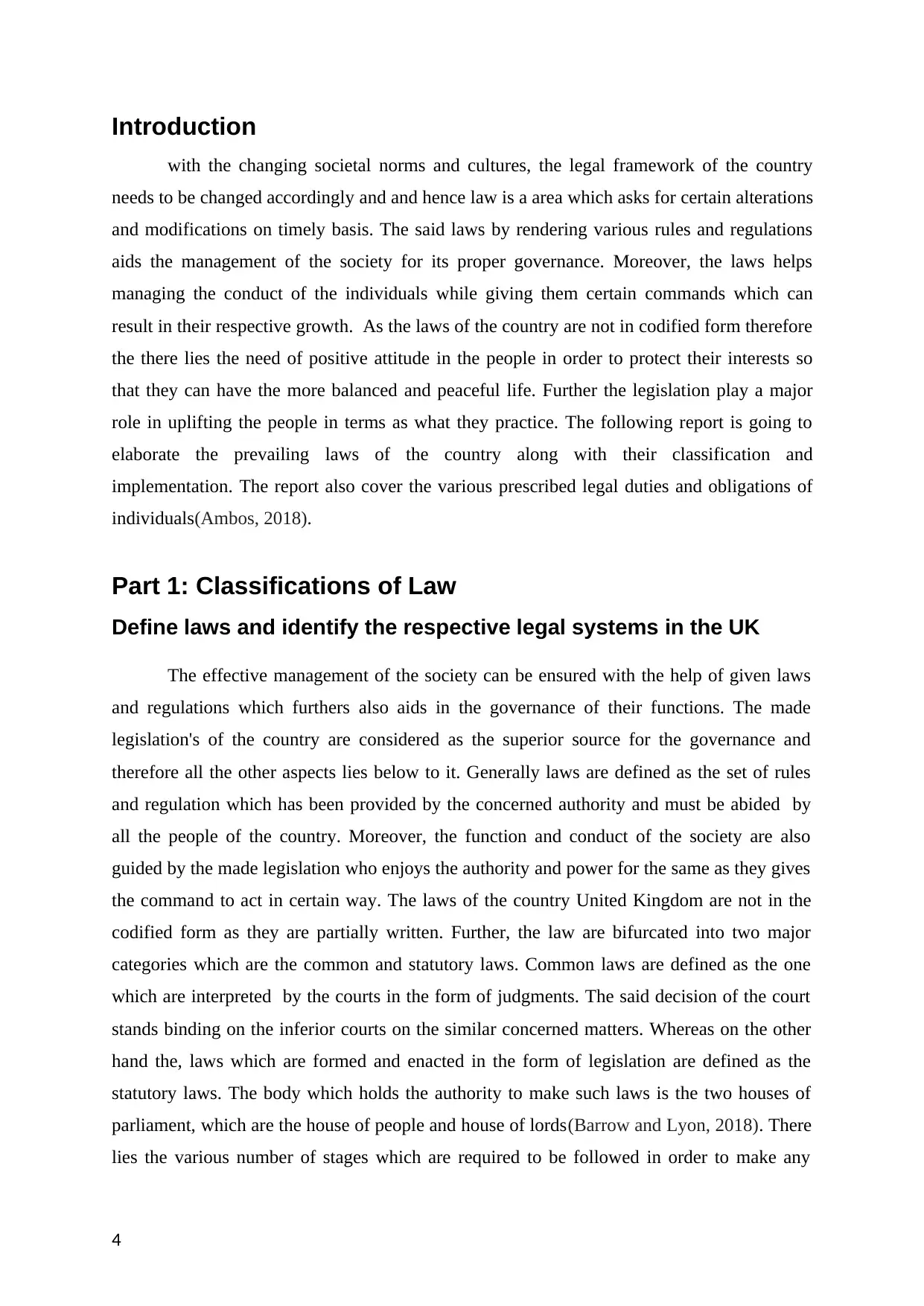
Introduction
with the changing societal norms and cultures, the legal framework of the country
needs to be changed accordingly and and hence law is a area which asks for certain alterations
and modifications on timely basis. The said laws by rendering various rules and regulations
aids the management of the society for its proper governance. Moreover, the laws helps
managing the conduct of the individuals while giving them certain commands which can
result in their respective growth. As the laws of the country are not in codified form therefore
the there lies the need of positive attitude in the people in order to protect their interests so
that they can have the more balanced and peaceful life. Further the legislation play a major
role in uplifting the people in terms as what they practice. The following report is going to
elaborate the prevailing laws of the country along with their classification and
implementation. The report also cover the various prescribed legal duties and obligations of
individuals(Ambos, 2018).
Part 1: Classifications of Law
Define laws and identify the respective legal systems in the UK
The effective management of the society can be ensured with the help of given laws
and regulations which furthers also aids in the governance of their functions. The made
legislation's of the country are considered as the superior source for the governance and
therefore all the other aspects lies below to it. Generally laws are defined as the set of rules
and regulation which has been provided by the concerned authority and must be abided by
all the people of the country. Moreover, the function and conduct of the society are also
guided by the made legislation who enjoys the authority and power for the same as they gives
the command to act in certain way. The laws of the country United Kingdom are not in the
codified form as they are partially written. Further, the law are bifurcated into two major
categories which are the common and statutory laws. Common laws are defined as the one
which are interpreted by the courts in the form of judgments. The said decision of the court
stands binding on the inferior courts on the similar concerned matters. Whereas on the other
hand the, laws which are formed and enacted in the form of legislation are defined as the
statutory laws. The body which holds the authority to make such laws is the two houses of
parliament, which are the house of people and house of lords(Barrow and Lyon, 2018). There
lies the various number of stages which are required to be followed in order to make any
4
with the changing societal norms and cultures, the legal framework of the country
needs to be changed accordingly and and hence law is a area which asks for certain alterations
and modifications on timely basis. The said laws by rendering various rules and regulations
aids the management of the society for its proper governance. Moreover, the laws helps
managing the conduct of the individuals while giving them certain commands which can
result in their respective growth. As the laws of the country are not in codified form therefore
the there lies the need of positive attitude in the people in order to protect their interests so
that they can have the more balanced and peaceful life. Further the legislation play a major
role in uplifting the people in terms as what they practice. The following report is going to
elaborate the prevailing laws of the country along with their classification and
implementation. The report also cover the various prescribed legal duties and obligations of
individuals(Ambos, 2018).
Part 1: Classifications of Law
Define laws and identify the respective legal systems in the UK
The effective management of the society can be ensured with the help of given laws
and regulations which furthers also aids in the governance of their functions. The made
legislation's of the country are considered as the superior source for the governance and
therefore all the other aspects lies below to it. Generally laws are defined as the set of rules
and regulation which has been provided by the concerned authority and must be abided by
all the people of the country. Moreover, the function and conduct of the society are also
guided by the made legislation who enjoys the authority and power for the same as they gives
the command to act in certain way. The laws of the country United Kingdom are not in the
codified form as they are partially written. Further, the law are bifurcated into two major
categories which are the common and statutory laws. Common laws are defined as the one
which are interpreted by the courts in the form of judgments. The said decision of the court
stands binding on the inferior courts on the similar concerned matters. Whereas on the other
hand the, laws which are formed and enacted in the form of legislation are defined as the
statutory laws. The body which holds the authority to make such laws is the two houses of
parliament, which are the house of people and house of lords(Barrow and Lyon, 2018). There
lies the various number of stages which are required to be followed in order to make any
4
Paraphrase This Document
Need a fresh take? Get an instant paraphrase of this document with our AI Paraphraser
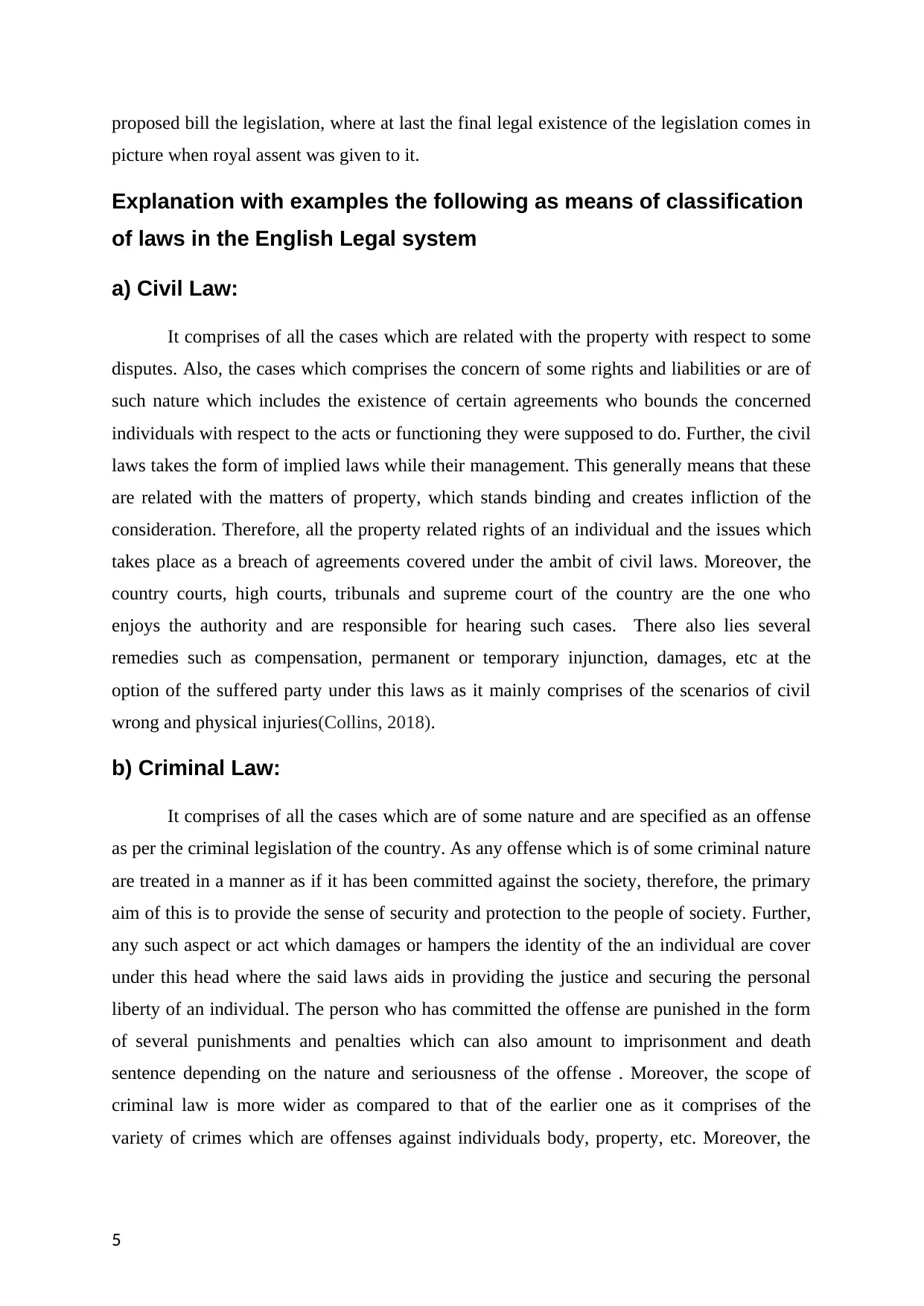
proposed bill the legislation, where at last the final legal existence of the legislation comes in
picture when royal assent was given to it.
Explanation with examples the following as means of classification
of laws in the English Legal system
a) Civil Law:
It comprises of all the cases which are related with the property with respect to some
disputes. Also, the cases which comprises the concern of some rights and liabilities or are of
such nature which includes the existence of certain agreements who bounds the concerned
individuals with respect to the acts or functioning they were supposed to do. Further, the civil
laws takes the form of implied laws while their management. This generally means that these
are related with the matters of property, which stands binding and creates infliction of the
consideration. Therefore, all the property related rights of an individual and the issues which
takes place as a breach of agreements covered under the ambit of civil laws. Moreover, the
country courts, high courts, tribunals and supreme court of the country are the one who
enjoys the authority and are responsible for hearing such cases. There also lies several
remedies such as compensation, permanent or temporary injunction, damages, etc at the
option of the suffered party under this laws as it mainly comprises of the scenarios of civil
wrong and physical injuries(Collins, 2018).
b) Criminal Law:
It comprises of all the cases which are of some nature and are specified as an offense
as per the criminal legislation of the country. As any offense which is of some criminal nature
are treated in a manner as if it has been committed against the society, therefore, the primary
aim of this is to provide the sense of security and protection to the people of society. Further,
any such aspect or act which damages or hampers the identity of the an individual are cover
under this head where the said laws aids in providing the justice and securing the personal
liberty of an individual. The person who has committed the offense are punished in the form
of several punishments and penalties which can also amount to imprisonment and death
sentence depending on the nature and seriousness of the offense . Moreover, the scope of
criminal law is more wider as compared to that of the earlier one as it comprises of the
variety of crimes which are offenses against individuals body, property, etc. Moreover, the
5
picture when royal assent was given to it.
Explanation with examples the following as means of classification
of laws in the English Legal system
a) Civil Law:
It comprises of all the cases which are related with the property with respect to some
disputes. Also, the cases which comprises the concern of some rights and liabilities or are of
such nature which includes the existence of certain agreements who bounds the concerned
individuals with respect to the acts or functioning they were supposed to do. Further, the civil
laws takes the form of implied laws while their management. This generally means that these
are related with the matters of property, which stands binding and creates infliction of the
consideration. Therefore, all the property related rights of an individual and the issues which
takes place as a breach of agreements covered under the ambit of civil laws. Moreover, the
country courts, high courts, tribunals and supreme court of the country are the one who
enjoys the authority and are responsible for hearing such cases. There also lies several
remedies such as compensation, permanent or temporary injunction, damages, etc at the
option of the suffered party under this laws as it mainly comprises of the scenarios of civil
wrong and physical injuries(Collins, 2018).
b) Criminal Law:
It comprises of all the cases which are of some nature and are specified as an offense
as per the criminal legislation of the country. As any offense which is of some criminal nature
are treated in a manner as if it has been committed against the society, therefore, the primary
aim of this is to provide the sense of security and protection to the people of society. Further,
any such aspect or act which damages or hampers the identity of the an individual are cover
under this head where the said laws aids in providing the justice and securing the personal
liberty of an individual. The person who has committed the offense are punished in the form
of several punishments and penalties which can also amount to imprisonment and death
sentence depending on the nature and seriousness of the offense . Moreover, the scope of
criminal law is more wider as compared to that of the earlier one as it comprises of the
variety of crimes which are offenses against individuals body, property, etc. Moreover, the
5
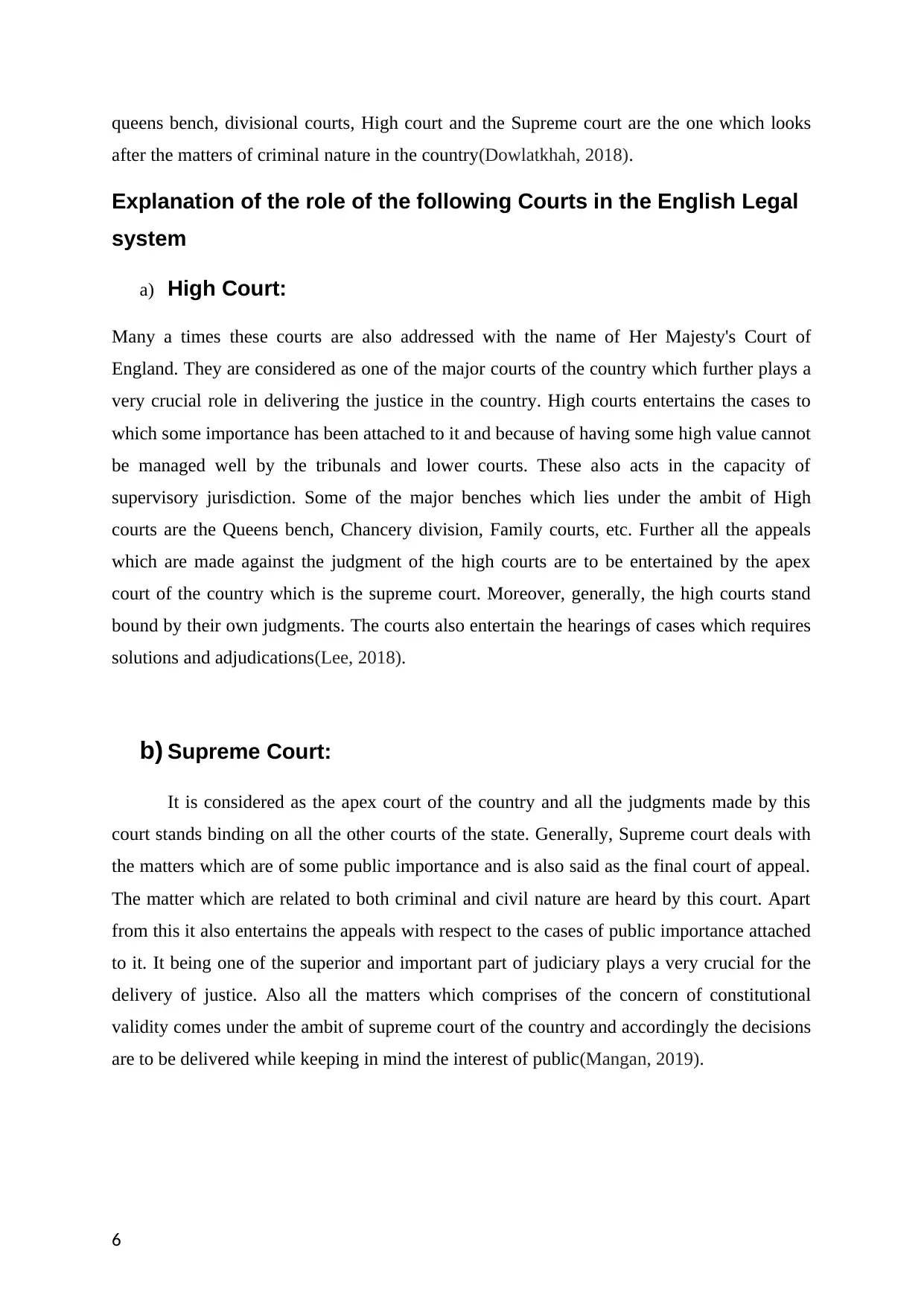
queens bench, divisional courts, High court and the Supreme court are the one which looks
after the matters of criminal nature in the country(Dowlatkhah, 2018).
Explanation of the role of the following Courts in the English Legal
system
a) High Court:
Many a times these courts are also addressed with the name of Her Majesty's Court of
England. They are considered as one of the major courts of the country which further plays a
very crucial role in delivering the justice in the country. High courts entertains the cases to
which some importance has been attached to it and because of having some high value cannot
be managed well by the tribunals and lower courts. These also acts in the capacity of
supervisory jurisdiction. Some of the major benches which lies under the ambit of High
courts are the Queens bench, Chancery division, Family courts, etc. Further all the appeals
which are made against the judgment of the high courts are to be entertained by the apex
court of the country which is the supreme court. Moreover, generally, the high courts stand
bound by their own judgments. The courts also entertain the hearings of cases which requires
solutions and adjudications(Lee, 2018).
b) Supreme Court:
It is considered as the apex court of the country and all the judgments made by this
court stands binding on all the other courts of the state. Generally, Supreme court deals with
the matters which are of some public importance and is also said as the final court of appeal.
The matter which are related to both criminal and civil nature are heard by this court. Apart
from this it also entertains the appeals with respect to the cases of public importance attached
to it. It being one of the superior and important part of judiciary plays a very crucial for the
delivery of justice. Also all the matters which comprises of the concern of constitutional
validity comes under the ambit of supreme court of the country and accordingly the decisions
are to be delivered while keeping in mind the interest of public(Mangan, 2019).
6
after the matters of criminal nature in the country(Dowlatkhah, 2018).
Explanation of the role of the following Courts in the English Legal
system
a) High Court:
Many a times these courts are also addressed with the name of Her Majesty's Court of
England. They are considered as one of the major courts of the country which further plays a
very crucial role in delivering the justice in the country. High courts entertains the cases to
which some importance has been attached to it and because of having some high value cannot
be managed well by the tribunals and lower courts. These also acts in the capacity of
supervisory jurisdiction. Some of the major benches which lies under the ambit of High
courts are the Queens bench, Chancery division, Family courts, etc. Further all the appeals
which are made against the judgment of the high courts are to be entertained by the apex
court of the country which is the supreme court. Moreover, generally, the high courts stand
bound by their own judgments. The courts also entertain the hearings of cases which requires
solutions and adjudications(Lee, 2018).
b) Supreme Court:
It is considered as the apex court of the country and all the judgments made by this
court stands binding on all the other courts of the state. Generally, Supreme court deals with
the matters which are of some public importance and is also said as the final court of appeal.
The matter which are related to both criminal and civil nature are heard by this court. Apart
from this it also entertains the appeals with respect to the cases of public importance attached
to it. It being one of the superior and important part of judiciary plays a very crucial for the
delivery of justice. Also all the matters which comprises of the concern of constitutional
validity comes under the ambit of supreme court of the country and accordingly the decisions
are to be delivered while keeping in mind the interest of public(Mangan, 2019).
6
⊘ This is a preview!⊘
Do you want full access?
Subscribe today to unlock all pages.

Trusted by 1+ million students worldwide
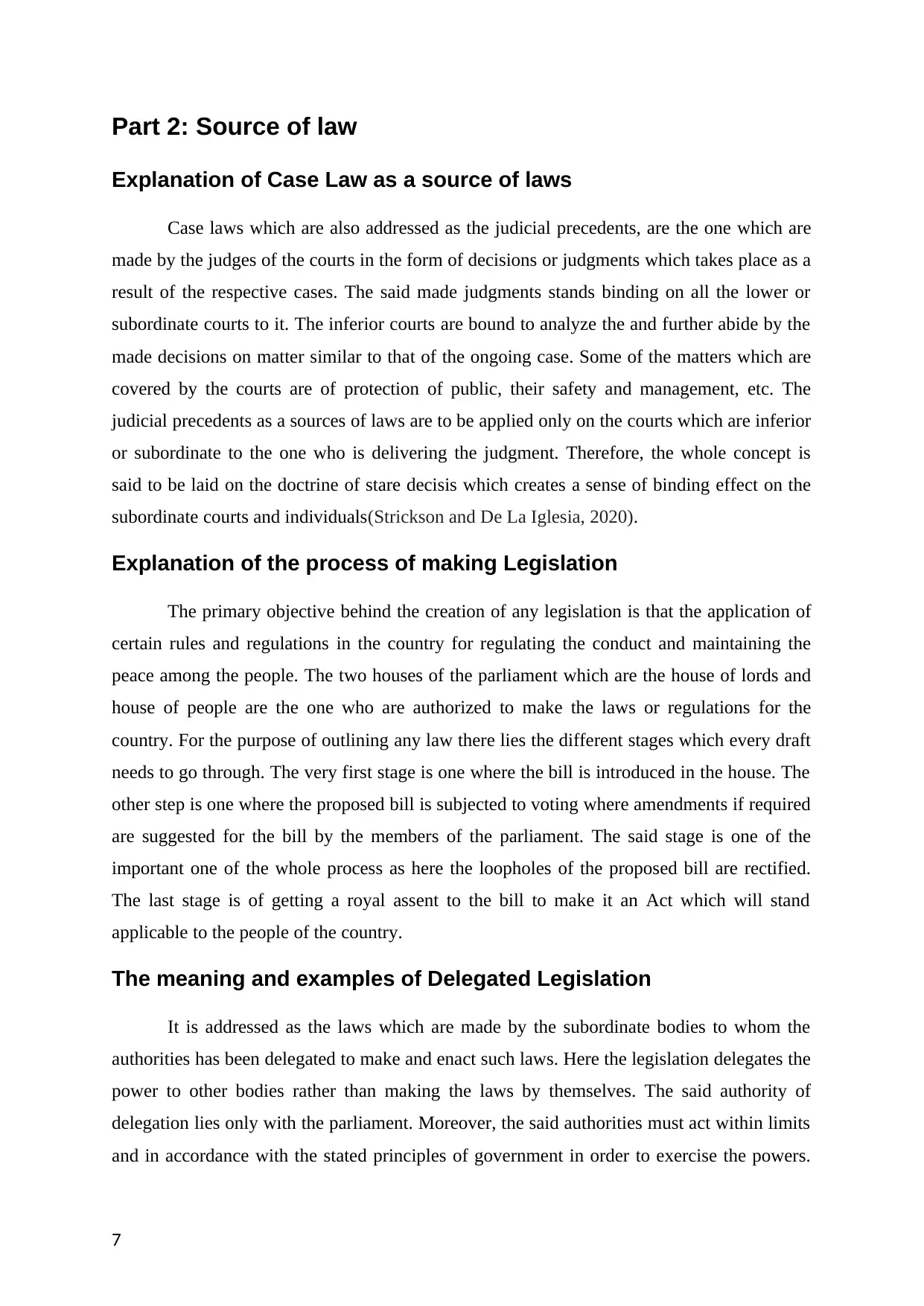
Part 2: Source of law
Explanation of Case Law as a source of laws
Case laws which are also addressed as the judicial precedents, are the one which are
made by the judges of the courts in the form of decisions or judgments which takes place as a
result of the respective cases. The said made judgments stands binding on all the lower or
subordinate courts to it. The inferior courts are bound to analyze the and further abide by the
made decisions on matter similar to that of the ongoing case. Some of the matters which are
covered by the courts are of protection of public, their safety and management, etc. The
judicial precedents as a sources of laws are to be applied only on the courts which are inferior
or subordinate to the one who is delivering the judgment. Therefore, the whole concept is
said to be laid on the doctrine of stare decisis which creates a sense of binding effect on the
subordinate courts and individuals(Strickson and De La Iglesia, 2020).
Explanation of the process of making Legislation
The primary objective behind the creation of any legislation is that the application of
certain rules and regulations in the country for regulating the conduct and maintaining the
peace among the people. The two houses of the parliament which are the house of lords and
house of people are the one who are authorized to make the laws or regulations for the
country. For the purpose of outlining any law there lies the different stages which every draft
needs to go through. The very first stage is one where the bill is introduced in the house. The
other step is one where the proposed bill is subjected to voting where amendments if required
are suggested for the bill by the members of the parliament. The said stage is one of the
important one of the whole process as here the loopholes of the proposed bill are rectified.
The last stage is of getting a royal assent to the bill to make it an Act which will stand
applicable to the people of the country.
The meaning and examples of Delegated Legislation
It is addressed as the laws which are made by the subordinate bodies to whom the
authorities has been delegated to make and enact such laws. Here the legislation delegates the
power to other bodies rather than making the laws by themselves. The said authority of
delegation lies only with the parliament. Moreover, the said authorities must act within limits
and in accordance with the stated principles of government in order to exercise the powers.
7
Explanation of Case Law as a source of laws
Case laws which are also addressed as the judicial precedents, are the one which are
made by the judges of the courts in the form of decisions or judgments which takes place as a
result of the respective cases. The said made judgments stands binding on all the lower or
subordinate courts to it. The inferior courts are bound to analyze the and further abide by the
made decisions on matter similar to that of the ongoing case. Some of the matters which are
covered by the courts are of protection of public, their safety and management, etc. The
judicial precedents as a sources of laws are to be applied only on the courts which are inferior
or subordinate to the one who is delivering the judgment. Therefore, the whole concept is
said to be laid on the doctrine of stare decisis which creates a sense of binding effect on the
subordinate courts and individuals(Strickson and De La Iglesia, 2020).
Explanation of the process of making Legislation
The primary objective behind the creation of any legislation is that the application of
certain rules and regulations in the country for regulating the conduct and maintaining the
peace among the people. The two houses of the parliament which are the house of lords and
house of people are the one who are authorized to make the laws or regulations for the
country. For the purpose of outlining any law there lies the different stages which every draft
needs to go through. The very first stage is one where the bill is introduced in the house. The
other step is one where the proposed bill is subjected to voting where amendments if required
are suggested for the bill by the members of the parliament. The said stage is one of the
important one of the whole process as here the loopholes of the proposed bill are rectified.
The last stage is of getting a royal assent to the bill to make it an Act which will stand
applicable to the people of the country.
The meaning and examples of Delegated Legislation
It is addressed as the laws which are made by the subordinate bodies to whom the
authorities has been delegated to make and enact such laws. Here the legislation delegates the
power to other bodies rather than making the laws by themselves. The said authority of
delegation lies only with the parliament. Moreover, the said authorities must act within limits
and in accordance with the stated principles of government in order to exercise the powers.
7
Paraphrase This Document
Need a fresh take? Get an instant paraphrase of this document with our AI Paraphraser
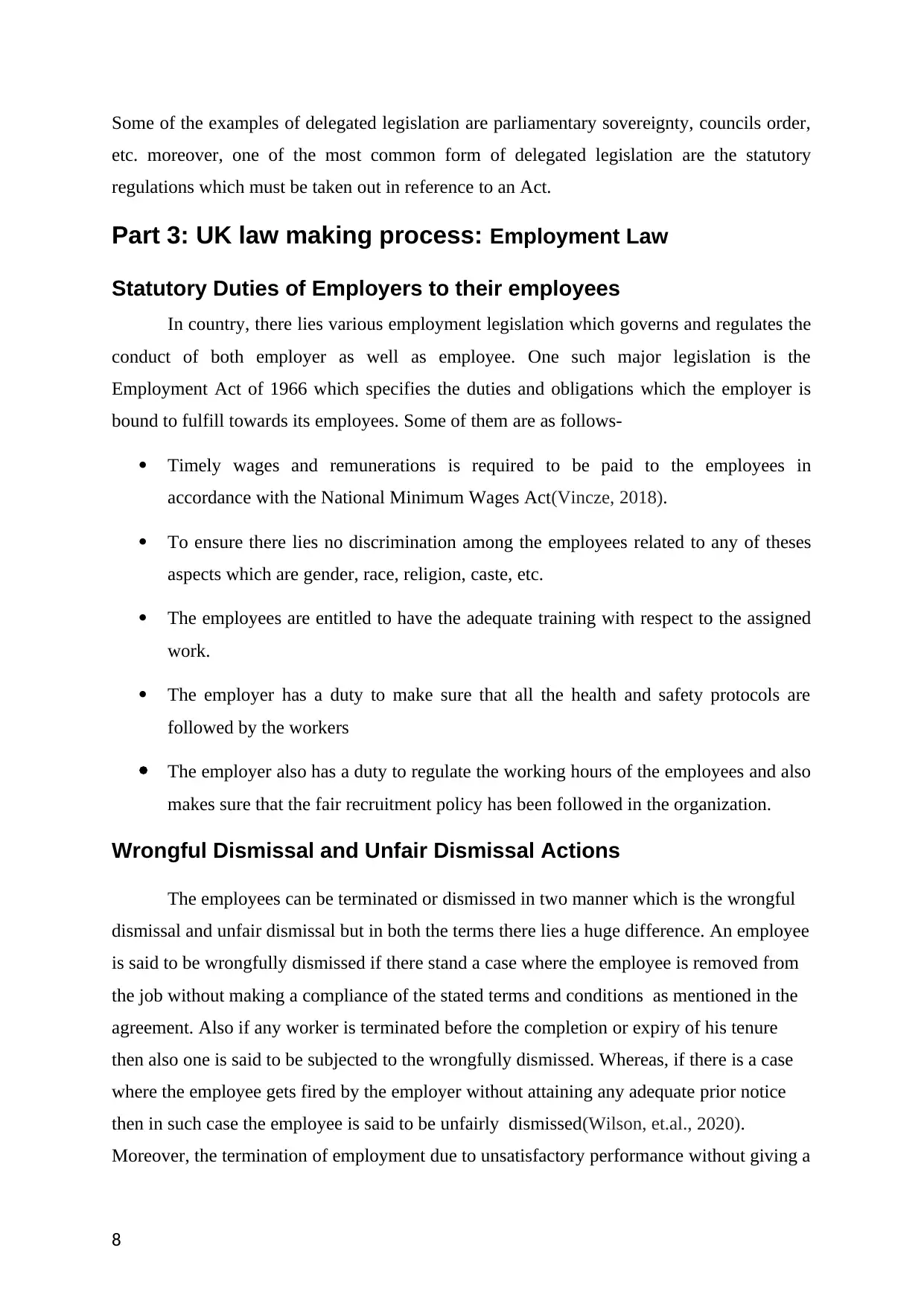
Some of the examples of delegated legislation are parliamentary sovereignty, councils order,
etc. moreover, one of the most common form of delegated legislation are the statutory
regulations which must be taken out in reference to an Act.
Part 3: UK law making process: Employment Law
Statutory Duties of Employers to their employees
In country, there lies various employment legislation which governs and regulates the
conduct of both employer as well as employee. One such major legislation is the
Employment Act of 1966 which specifies the duties and obligations which the employer is
bound to fulfill towards its employees. Some of them are as follows-
Timely wages and remunerations is required to be paid to the employees in
accordance with the National Minimum Wages Act(Vincze, 2018).
To ensure there lies no discrimination among the employees related to any of theses
aspects which are gender, race, religion, caste, etc.
The employees are entitled to have the adequate training with respect to the assigned
work.
The employer has a duty to make sure that all the health and safety protocols are
followed by the workers
The employer also has a duty to regulate the working hours of the employees and also
makes sure that the fair recruitment policy has been followed in the organization.
Wrongful Dismissal and Unfair Dismissal Actions
The employees can be terminated or dismissed in two manner which is the wrongful
dismissal and unfair dismissal but in both the terms there lies a huge difference. An employee
is said to be wrongfully dismissed if there stand a case where the employee is removed from
the job without making a compliance of the stated terms and conditions as mentioned in the
agreement. Also if any worker is terminated before the completion or expiry of his tenure
then also one is said to be subjected to the wrongfully dismissed. Whereas, if there is a case
where the employee gets fired by the employer without attaining any adequate prior notice
then in such case the employee is said to be unfairly dismissed(Wilson, et.al., 2020).
Moreover, the termination of employment due to unsatisfactory performance without giving a
8
etc. moreover, one of the most common form of delegated legislation are the statutory
regulations which must be taken out in reference to an Act.
Part 3: UK law making process: Employment Law
Statutory Duties of Employers to their employees
In country, there lies various employment legislation which governs and regulates the
conduct of both employer as well as employee. One such major legislation is the
Employment Act of 1966 which specifies the duties and obligations which the employer is
bound to fulfill towards its employees. Some of them are as follows-
Timely wages and remunerations is required to be paid to the employees in
accordance with the National Minimum Wages Act(Vincze, 2018).
To ensure there lies no discrimination among the employees related to any of theses
aspects which are gender, race, religion, caste, etc.
The employees are entitled to have the adequate training with respect to the assigned
work.
The employer has a duty to make sure that all the health and safety protocols are
followed by the workers
The employer also has a duty to regulate the working hours of the employees and also
makes sure that the fair recruitment policy has been followed in the organization.
Wrongful Dismissal and Unfair Dismissal Actions
The employees can be terminated or dismissed in two manner which is the wrongful
dismissal and unfair dismissal but in both the terms there lies a huge difference. An employee
is said to be wrongfully dismissed if there stand a case where the employee is removed from
the job without making a compliance of the stated terms and conditions as mentioned in the
agreement. Also if any worker is terminated before the completion or expiry of his tenure
then also one is said to be subjected to the wrongfully dismissed. Whereas, if there is a case
where the employee gets fired by the employer without attaining any adequate prior notice
then in such case the employee is said to be unfairly dismissed(Wilson, et.al., 2020).
Moreover, the termination of employment due to unsatisfactory performance without giving a
8
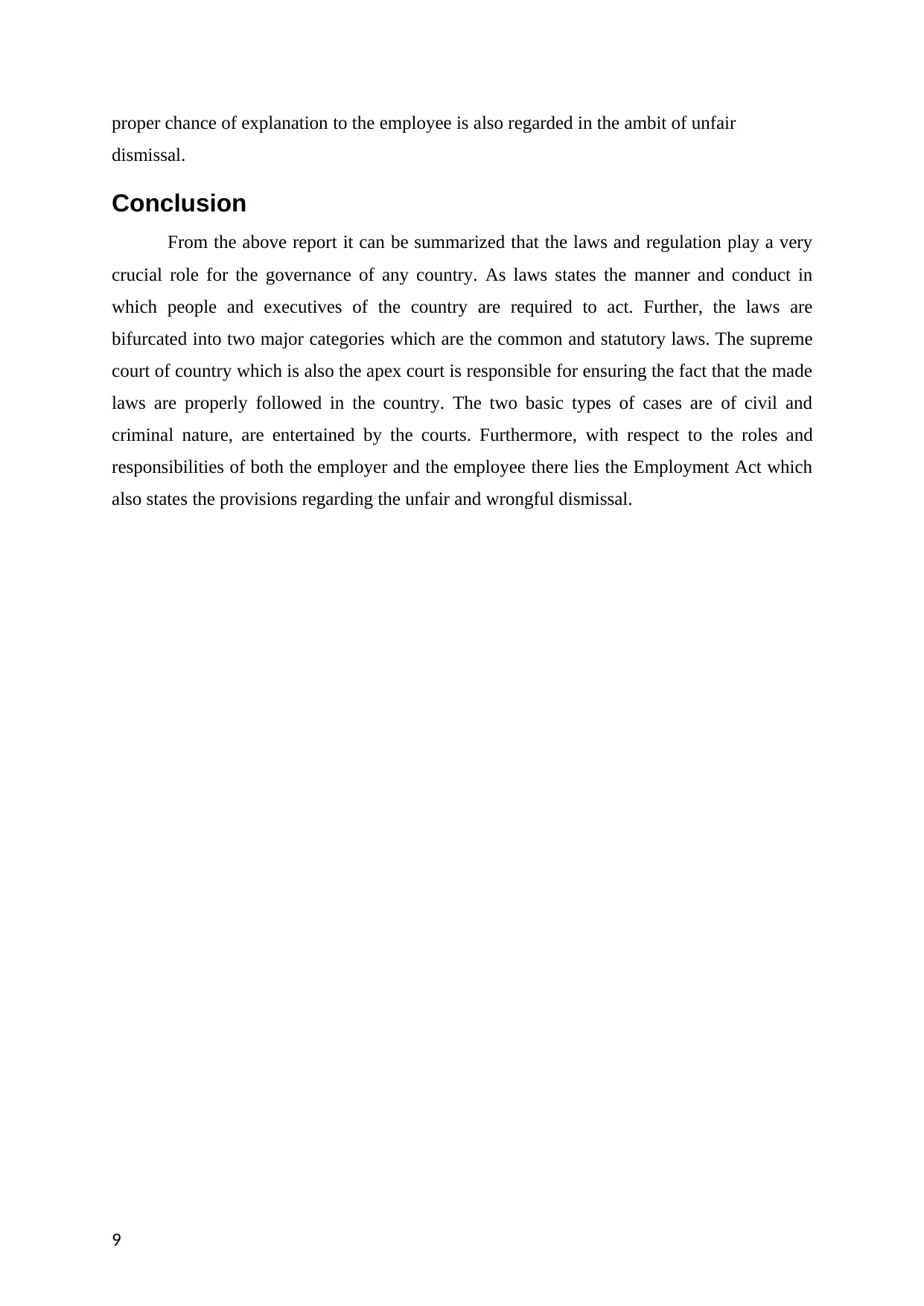
proper chance of explanation to the employee is also regarded in the ambit of unfair
dismissal.
Conclusion
From the above report it can be summarized that the laws and regulation play a very
crucial role for the governance of any country. As laws states the manner and conduct in
which people and executives of the country are required to act. Further, the laws are
bifurcated into two major categories which are the common and statutory laws. The supreme
court of country which is also the apex court is responsible for ensuring the fact that the made
laws are properly followed in the country. The two basic types of cases are of civil and
criminal nature, are entertained by the courts. Furthermore, with respect to the roles and
responsibilities of both the employer and the employee there lies the Employment Act which
also states the provisions regarding the unfair and wrongful dismissal.
9
dismissal.
Conclusion
From the above report it can be summarized that the laws and regulation play a very
crucial role for the governance of any country. As laws states the manner and conduct in
which people and executives of the country are required to act. Further, the laws are
bifurcated into two major categories which are the common and statutory laws. The supreme
court of country which is also the apex court is responsible for ensuring the fact that the made
laws are properly followed in the country. The two basic types of cases are of civil and
criminal nature, are entertained by the courts. Furthermore, with respect to the roles and
responsibilities of both the employer and the employee there lies the Employment Act which
also states the provisions regarding the unfair and wrongful dismissal.
9
⊘ This is a preview!⊘
Do you want full access?
Subscribe today to unlock all pages.

Trusted by 1+ million students worldwide
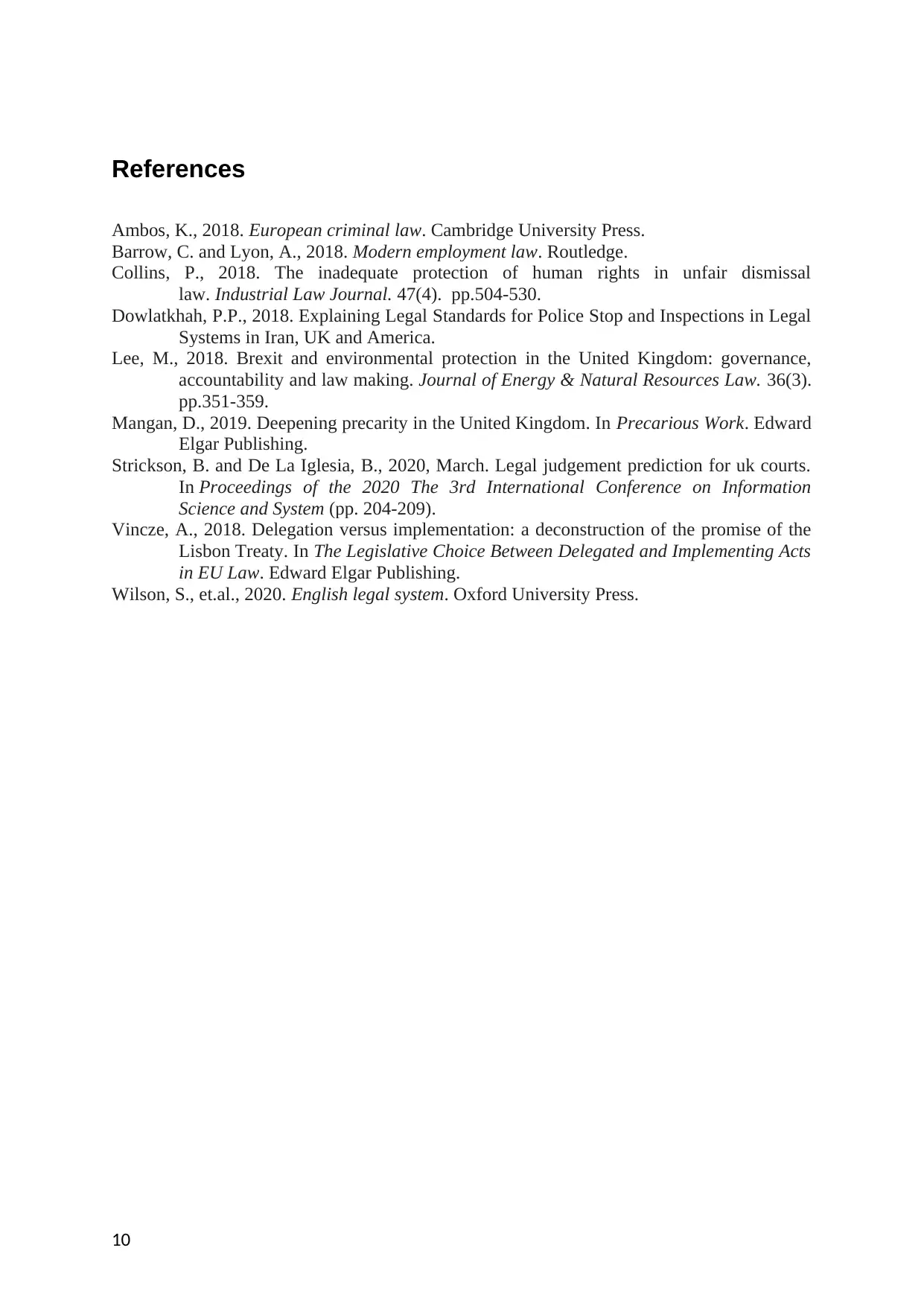
References
Ambos, K., 2018. European criminal law. Cambridge University Press.
Barrow, C. and Lyon, A., 2018. Modern employment law. Routledge.
Collins, P., 2018. The inadequate protection of human rights in unfair dismissal
law. Industrial Law Journal. 47(4). pp.504-530.
Dowlatkhah, P.P., 2018. Explaining Legal Standards for Police Stop and Inspections in Legal
Systems in Iran, UK and America.
Lee, M., 2018. Brexit and environmental protection in the United Kingdom: governance,
accountability and law making. Journal of Energy & Natural Resources Law. 36(3).
pp.351-359.
Mangan, D., 2019. Deepening precarity in the United Kingdom. In Precarious Work. Edward
Elgar Publishing.
Strickson, B. and De La Iglesia, B., 2020, March. Legal judgement prediction for uk courts.
In Proceedings of the 2020 The 3rd International Conference on Information
Science and System (pp. 204-209).
Vincze, A., 2018. Delegation versus implementation: a deconstruction of the promise of the
Lisbon Treaty. In The Legislative Choice Between Delegated and Implementing Acts
in EU Law. Edward Elgar Publishing.
Wilson, S., et.al., 2020. English legal system. Oxford University Press.
10
Ambos, K., 2018. European criminal law. Cambridge University Press.
Barrow, C. and Lyon, A., 2018. Modern employment law. Routledge.
Collins, P., 2018. The inadequate protection of human rights in unfair dismissal
law. Industrial Law Journal. 47(4). pp.504-530.
Dowlatkhah, P.P., 2018. Explaining Legal Standards for Police Stop and Inspections in Legal
Systems in Iran, UK and America.
Lee, M., 2018. Brexit and environmental protection in the United Kingdom: governance,
accountability and law making. Journal of Energy & Natural Resources Law. 36(3).
pp.351-359.
Mangan, D., 2019. Deepening precarity in the United Kingdom. In Precarious Work. Edward
Elgar Publishing.
Strickson, B. and De La Iglesia, B., 2020, March. Legal judgement prediction for uk courts.
In Proceedings of the 2020 The 3rd International Conference on Information
Science and System (pp. 204-209).
Vincze, A., 2018. Delegation versus implementation: a deconstruction of the promise of the
Lisbon Treaty. In The Legislative Choice Between Delegated and Implementing Acts
in EU Law. Edward Elgar Publishing.
Wilson, S., et.al., 2020. English legal system. Oxford University Press.
10
1 out of 10
Related Documents
Your All-in-One AI-Powered Toolkit for Academic Success.
+13062052269
info@desklib.com
Available 24*7 on WhatsApp / Email
![[object Object]](/_next/static/media/star-bottom.7253800d.svg)
Unlock your academic potential
Copyright © 2020–2026 A2Z Services. All Rights Reserved. Developed and managed by ZUCOL.
